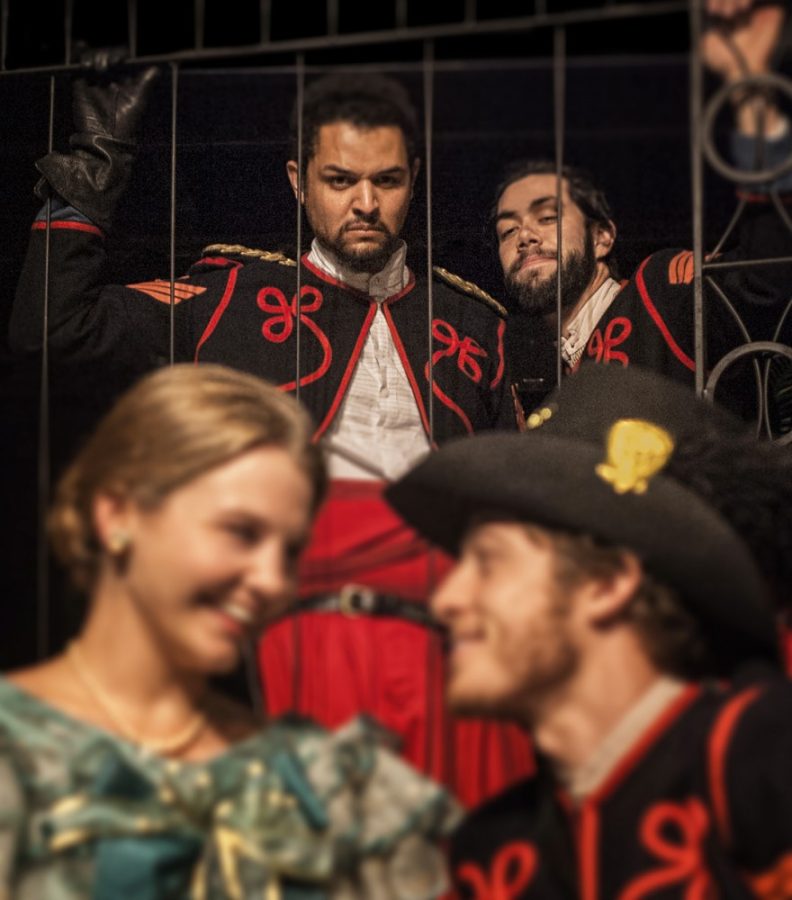“Othello” is the tale of a man devoted to his new bride, who is unknowingly influenced by Iago, the very extract of evil. It is a story of love ultimately poisoned by cruel company.
UA artistic director for the Arizona Repertory Theatre, Brent Gibbs, directs the Shakespearean drama with such exquisite execution, it is a wonder the university has managed to hang on to this rare talent.
Staged within the Tornabene Theatre, the audience is seated on either side of the area reserved for the performance. The actors exit and enter from behind the sets and audience, creating a 360-degree immersive experience.
The nearness of the actors allows the audience to be in the midst of their celebrations, but it is also an uneasy experience akin to hiding in a closet during private disclosures. It is especially discomforting when Iago speaks directly to the audience, including them in his schemes; it adds a sense of complicity, helplessness and unshakeable guilt for the impending tragedy.
Iago, Othello’s trusted comrade, has been cited as one of the most evil characters in fiction. Matthew Bowdren’s enthralling interpretation of Iago solidifies this reasoning as he schemes to destroy Othello and all outranking him. Bowdren’s Iago is the serpent in the garden, the evil that rotted the portrait of Dorian Gray. He is the devil’s apprentice and is so unsettling, it is difficult to be shut in a theater with him.
Chris Okawa’s first entrance as Othello answers any inquiry as to why he is a distinguished general in the Venetian army. His composure commands a room, and his authority is respected. Okawa’s Othello is a triumph from his introduction as the model of military integrity, to becoming ruthlessly consumed by the green-eyed monster and his fatal end.
Kierna Connor’s Desdemona is similar to Melanie Wilkes in “Gone With the Wind,” but with gentle humor. Her Desdemona is rich with emotional complexity in her innocence as she hauntingly sings “The Willow Song.”
The supporting actors, including Lauren Bardon, Ethan Kirschbaum, David Hentz, Bryn Booth, Keenan Larson and David Weynand, were each superb in their performances and brought the atmosphere to life.
Though the play is set in Venice and Cyprus, the Civil War-era clothing captures the work’s inescapable racial hostility, especially when Desdemona’s father sends a lynching mob of hicks with shotguns and pitchforks after Othello elopes with his daughter.
Once a soldier bound to the duty of the greater good, Othello’s mind is poisoned by Iago until he no longer recognizes what is good and who speaks truth. The seed of doubt Iago plants in Othello, calling into question his wife’s fidelity, quickly escalates as he spends less time with his wife and more time in the company of a man determined to destroy him.
Othello was accused by his father-in-law of using drugs and witchcraft to induce Desdemona’s affection, but it is Othello who seems to be the recipient of the dark arts by Iago. Once Othello enters an all-consuming fury from which he cannot return, he strikes Desdemona in front of his officers and friends, calling her a whore. The violence is not downplayed.
The production in no way implies that abuse could ever be a symptom of love. Arizona Repertory Theatre’s “Othello” doesn’t shy away from the themes that made the play controversially famous, and it doesn’t make excuses. It does show that, with the right cast and creative team, “Othello” can be seen for what the play is: a powerful piece of literature.
“Othello” can be seen until April 5 at the Tornabene Theatre.
_______________
Follow Anna Mae Ludlum on Twitter.









